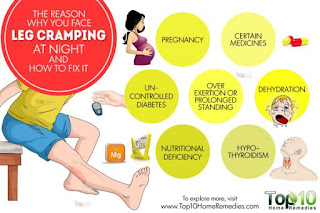Here are some of the reasons why you have leg cramping at night.
1. Dehydration
Proper hydration contributes to a healthier body and mind. It also
impacts the performance of your muscles .
Water comprises 75 percent of muscle tissue and helps them contract and relax easily. So, not maintaining proper levels of hydration during the day may be one of the big causes of leg cramps at night.
Water is also important for proper circulation of nutrients in the body. Without water, muscles will be deprived of important nutrients, which can lead to imbalances of electrolytes (mainly sodium, potassium, calcium and magnesium).
In fact, even small amounts of dehydration may hinder athletic performance and increase the chance of cramps at night.
2. Nutritional Deficiency
Any kind of imbalance of mineral electrolytes—sodium, potassium, calcium and magnesium—in the body can contribute to nocturnal and exercise-associated cramps.
These minerals are responsible for both nerve impulses and muscle contractions, and keep your muscles working smoothly.
Sodium, one of the main positively charged mineral ions or electrolytes in body fluid, helps maintain a normal body-fluid balance and is critical for nerve impulse generation and muscle contraction.
Potassium is an important electrolyte found in all body cells, including muscle and nerve cells. It works along with sodium and chloride to generate electrical impulses in the nerves and the muscles.
Calcium is involved in muscle contractions as well as the generation of nerve impulses.
Magnesium aids in stabilizing adenosine triphosphate (ATP), the energy source for muscle contractions, and also serves as an electrolyte in body fluids.
Deficiency of any of these minerals can lead to cramps and other muscle-related problems.
Additionally, certain B vitamins impact muscle function, particularly vitamin B12.
3. Overexertion or Prolonged Standing
Standing on a hard surface for a long time as well as standing while
wearing high heels or poorly fitting shoes can contribute to muscle fatigue or overexertion. This in turn can cause leg cramps at night.
A 2012 study published in Ergonomics showed that prolonged standing at work may be an important risk factor for varicose veins and nocturnal leg cramps among both men and women.
The study even suggests that interventions to interrupt or reduce prolonged standing at work should be implemented to prevent these problems.
Also, sitting improperly or putting your legs in awkward and uncomfortable positions when sleeping can contribute to nocturnal leg cramps.
4. Pregnancy
Pregnant women often experience leg cramps at night, usually starting in the second trimester and lasting through the third trimester. These cramps may vary in intensity, from mild to extremely painful.
Leg cramps during pregnancy may be due to the increasing pressure of the uterus on certain nerves, fatigue, or reduced circulation in the legs from the pressure of the baby on blood vessels.
During pregnancy, if you frequently suffer from leg cramps either during the day or at night, it is important to discuss this problem with your doctor.
5. Hypothyroidism
A low level of thyroid hormones can indirectly contribute to muscle weakness as well as calf cramps at night.
The thyroid hormones can affect calcium absorption and utilization. Calcium deficiency is associated with muscle weakness, numbness, pain and cramps.
Also, low thyroid hormones lead to low metabolism. High metabolism is important for energy as well as how your muscles feel after doing your regular exercises.
A low level of thyroid hormones also often increases inflammation that may be contributing to your muscle cramping and pain.

No comments:
Post a Comment